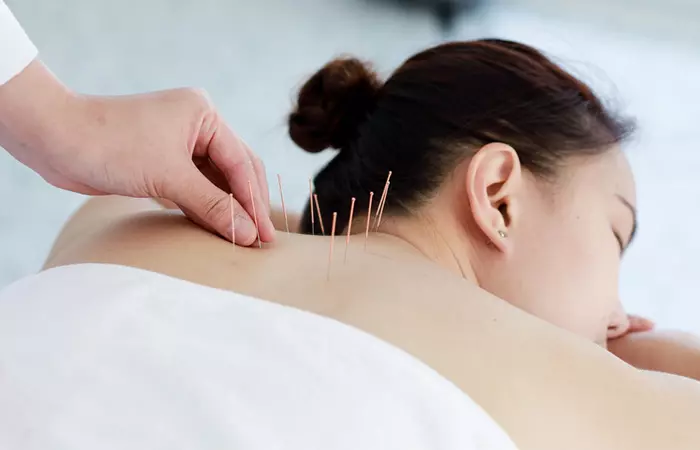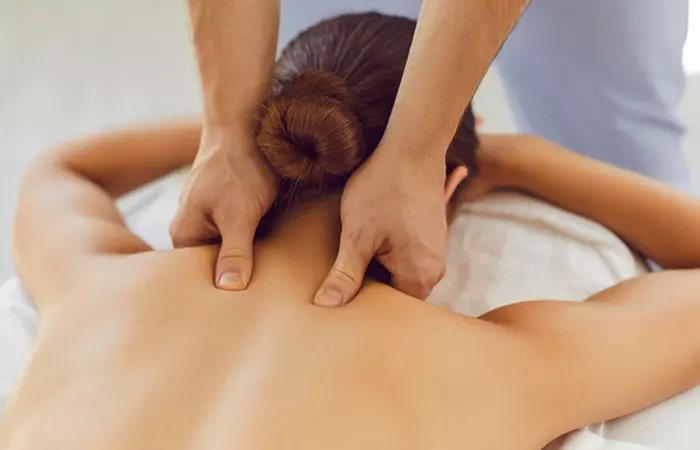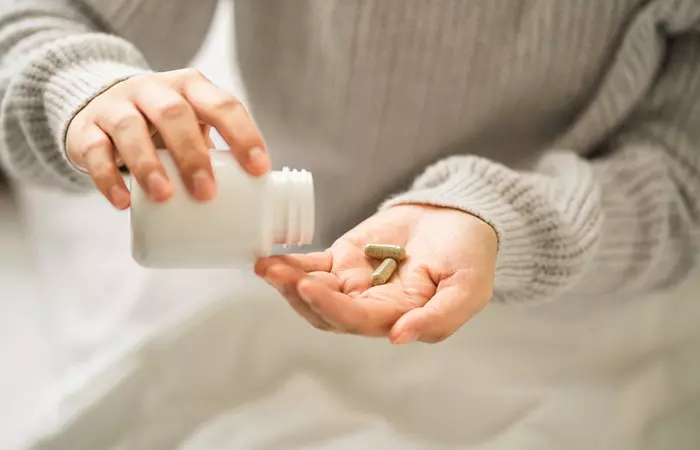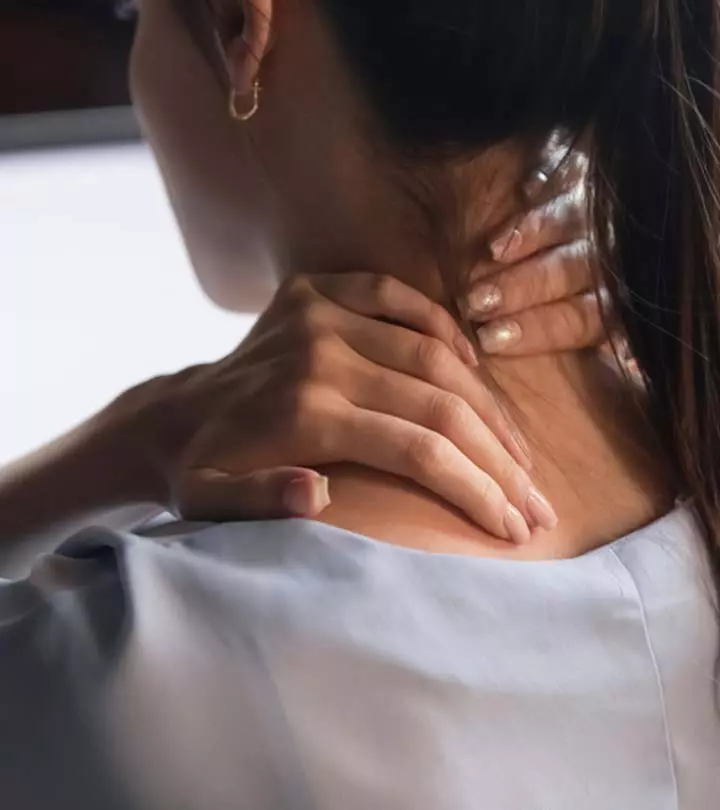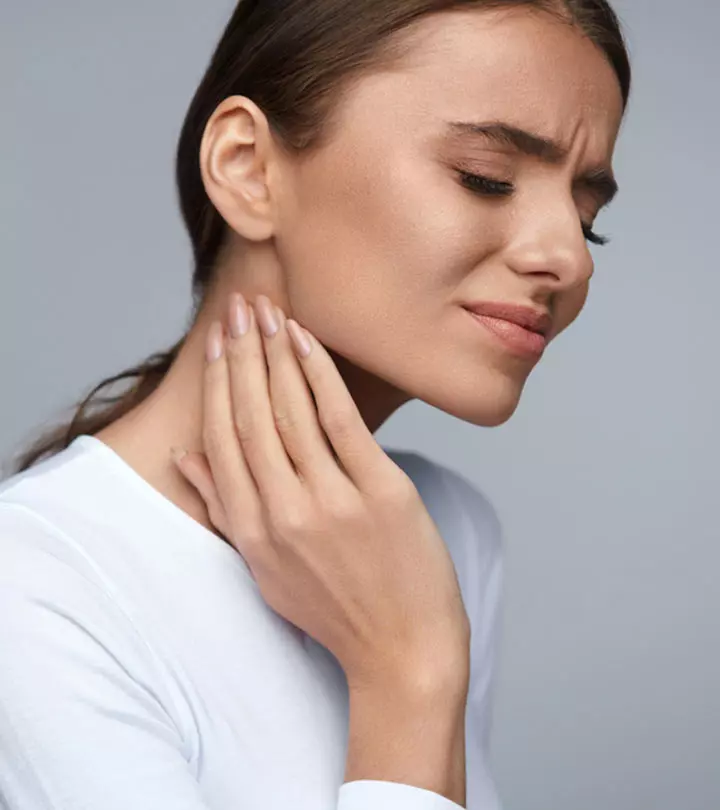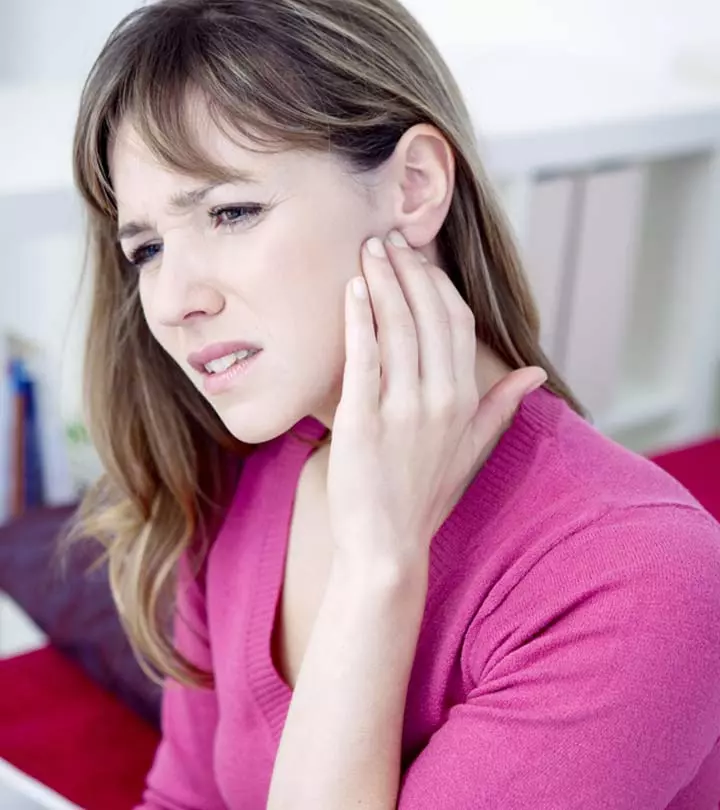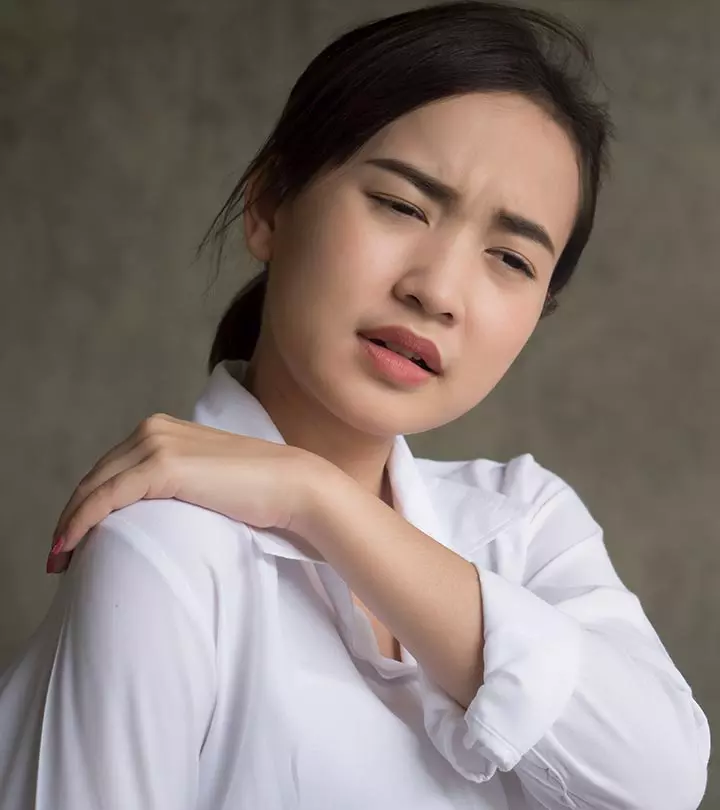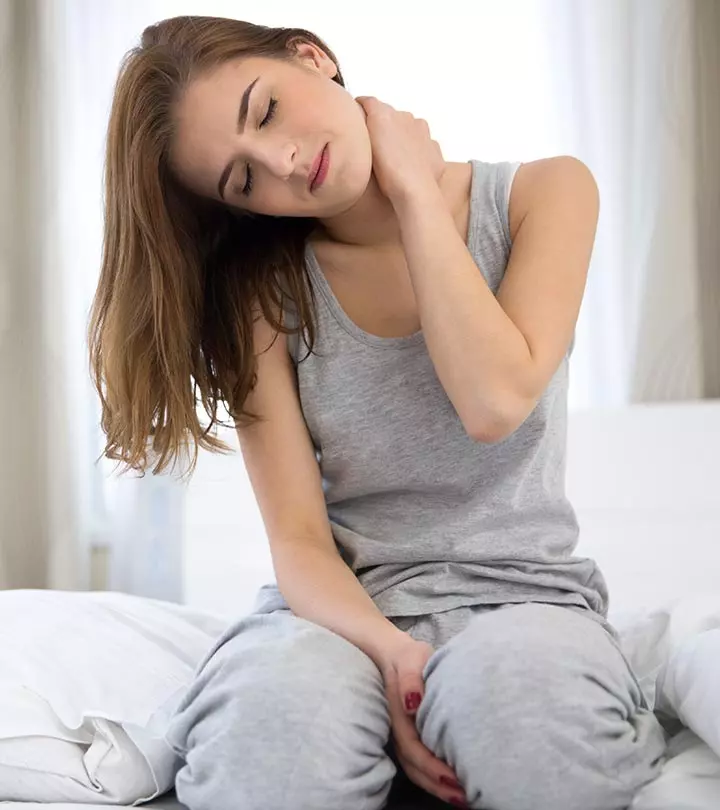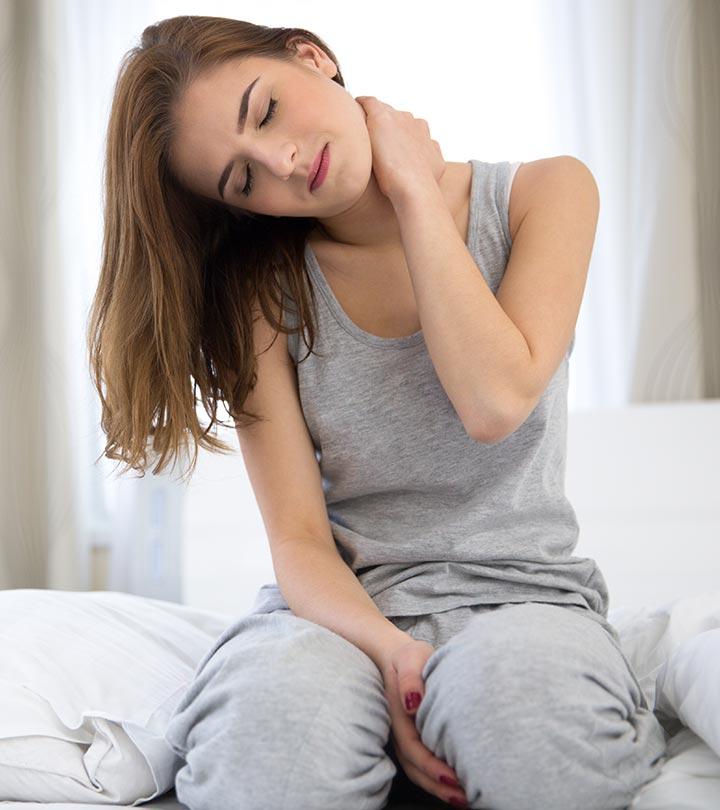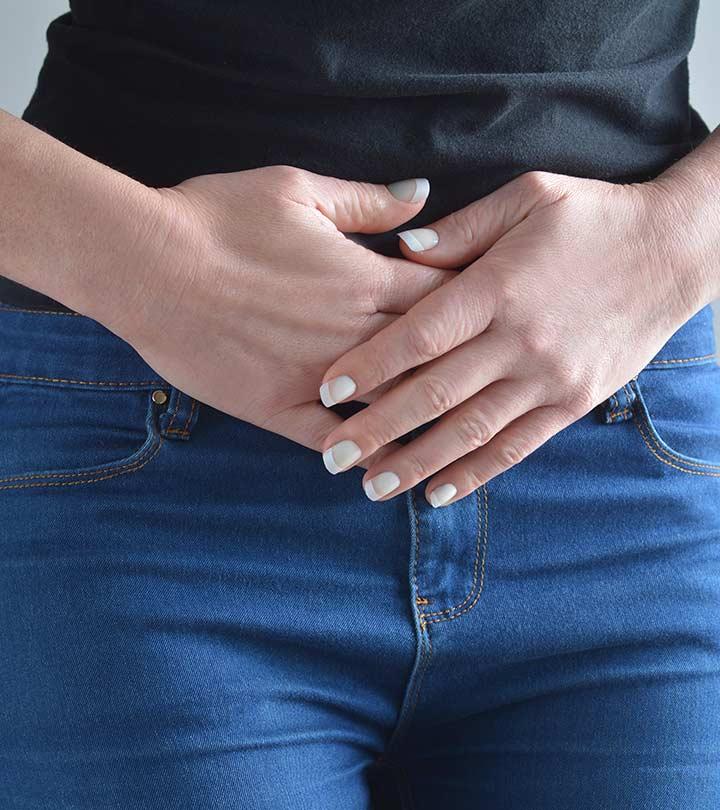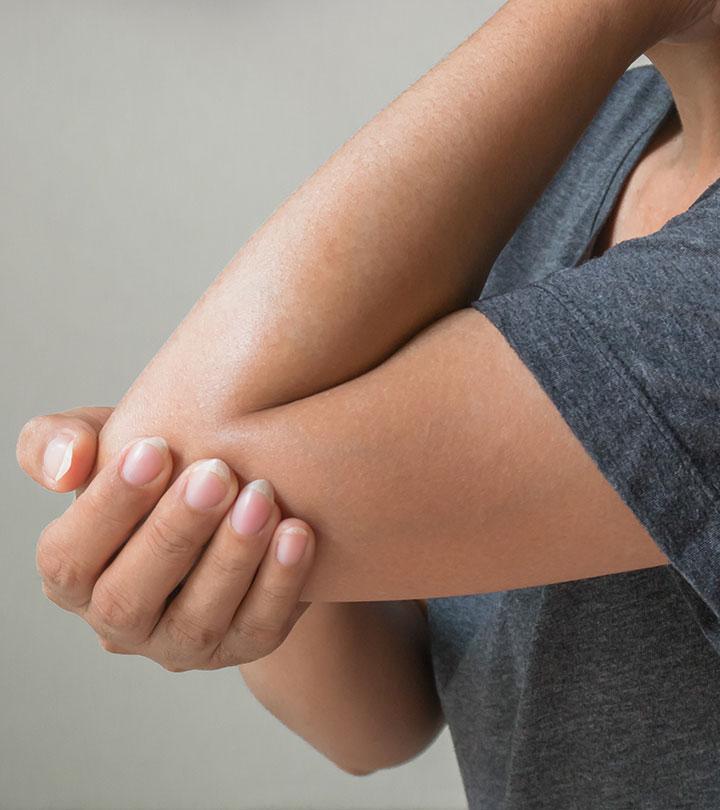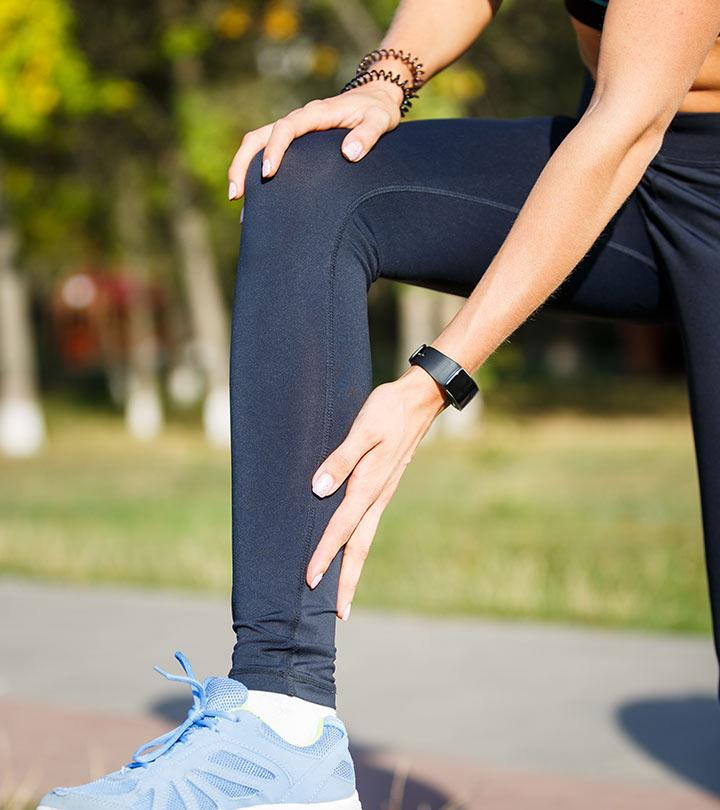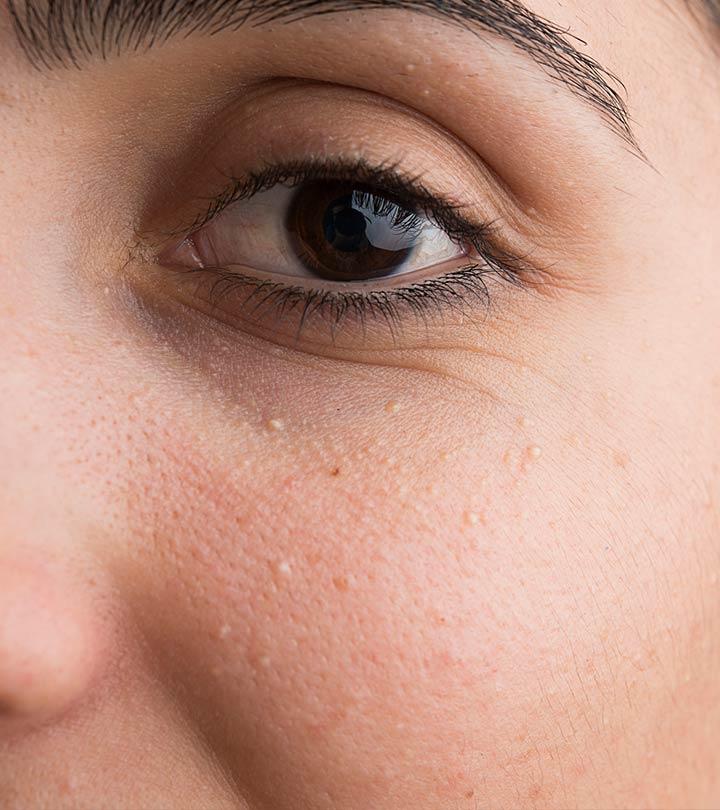11 Home Remedies For Neck Pain | Causes & Prevention Tips
A list of relieving stretches and antidotes to ease the discomfort of a stiff neck.

Image: iStock
Sitting for hours on end, staring at your laptop or mobile at odd angles can cause neck pain. Uncomfortable and painful, neck pain can interfere with your daily activities and disrupt a good night’s sleep. Thankfully, there are a few natural remedies that can help you get rid of neck pain. In this article, we explore some of the causes and exercises you can do to relieve your neck pain effectively. Read on to know more!
In This Article
Causes Of Neck Pain
You may develop neck pain due to bad sleeping postures, tension and/or stress, long hours of leaning, lying on an excessively soft mattress, or bad body posture. Muscle tension, discomfort and injury on the neck are the most common causes of neck pain (1).
It is important to diagnose and counteract the problem at the onset to prevent it from becoming worse. The best way to heal neck pain is through chiropractic care. These natural home remedies may also help to ease the pain.
How To Relieve Neck Pain
1. Exercises
Strengthening exercises rely on adding load on your muscles progressively, making them stronger and more flexible. Exercise can help in relieving neck pain and make the neck flexible and strong, apart from reducing stiffness (2).
You Will Need
Preset exercise routine
What You Can Do
Performing a simple set of exercises could ease neck pain:
- Nod your head forward and backward for some time, and then gradually start nodding from one side to the other.
- Once your muscles feel less tense, slowly turn your head completely towards the left, and then completely towards your right. This might hurt a bit, so take it slow.
- Do at least 20 repetitions.
- Do this exercise every few hours, and you’ll find the stiffness in your neck ease away.
How Often Should You Do This
Do this at least 5 days a week.
Renato Caliari, a lifestyle blogger, wrote about how exercises helped minimize his neck pain. He said, “In the last years, I’ve been doing high-intensity training. I believe it’s safe and enough to keep my muscles strong and healthy without spending hours on unnecessary and risky exercises (i).”
2. Yoga
Stress can induce muscle tension. Following traditional relaxation techniques, such as yoga, can help your body relax and relieve the tension around the neck and shoulders (3).
You Will Need
A yoga mat
What You Can Do
Here are a few yoga poses known to relieve neck pain:
- Bharadvajasana – This is also called the Twist Pose. It can relieve the tension in the neck and shoulder muscles and alleviate pain.
- Marjariasana – This is also known as the Cat Pose. It can help in stretching out your spine and back muscles to relieve neck pain. It might also help improve fibromyalgia and relieve fatigue as well.
- Uttana Shishosana – This pose will extend your spine and also increase blood flow to the neck and head. It might also relieve herniated disc pain as well.
- Balasana – This is also called the Child’s Pose. It is a simple asana to stretch the neck and back gently. Use this asana as a resting pose between the other poses.
- Savasana – This relaxation pose can calm the mind and body and relieve stress.
How Often Should You Do This
5-7 days a week.
According to a study, around 33% of individuals among 81,671,436 participants reported experiencing low back and neck pain. Among them, a higher number of people used various meditation techniques such as mantra, spirituality, mindfulness, guided imagery, and progressive relaxation as compared to those who did not report pain. Spiritual meditation was the most popular method, with around 12.6% of participants using it, closely followed by mindfulness meditation and progressive relaxation, with 6.9% and 5.4% of people practicing them, respectively. The study also found that people with low back and neck pain consulted practitioners of CIM (Complementary and Integrative Medicine) more often than those without pain.
3. Essential Oils
Peppermint oil has anti-inflammatory properties that can help to soothe sore muscles (4). Lavender oil is often used in aromatherapy to relax the mind. It can also soothe the muscles of the body. Relieving stress and anxiety can also help in easing physical tension (5). Basil oil is antispasmodici A property or drug that reduces the frequency of muscle spasms, especially those that affect smooth muscles like that in the gut wall. and analgesici A drug type that cures pain without altering sensory perception, blocking nerve impulse transmission, or interfering with consciousness. . It is also useful in reducing stress and can be used to reduce neck pain (6).
You Will Need
- A few drops of peppermint oil
- A few drops of lavender oil
- A few drops of basil oil
- 1 teaspoon of olive oil
What You Have To Do
- Make a blend of the essential oils.
- Mix a few drops of this blend with warm olive oil.
- Massage this oil on the neck for a few minutes.
- You can also use these oils individually or any combination of the oils. Do not forget to dilute it in a carrier oil.
How Often You Should Do This
Apply this twice a day. It might leave a tingling sensation, but it will help in relieving the pains, such as headache, shoulder pain, back pain and even muscle strain.
4. Acupuncture
Acupuncture is a method in which tiny needles are inserted in specific and strategic points of the skin. It has been widely used to treat any kind of pain, and studies recommend acupuncture as an alternative to traditional medicine for short-term relief from neck pains, such as whiplash (7).
What You Can Do
Book a session with an acupuncture practitioner nearby.
You Will Need
Consult a certified therapist to treat your neck pain through acupuncture.
How Often Should You Do It
One or two sessions a week for a few months.
5. Apple Cider Vinegar
Apple cider vinegar is an excellent home remedy for neck pain and stiffness. The antioxidants and anti-inflammatory agents present in apple cider vinegar can relieve the stress in the neck muscles and reduce the pain (8).
You Will Need
- Apple cider vinegar
- A paper napkin or tissue
What You Have To Do
- Soak the napkin in vinegar and place this on your neck.
- Leave it on for an hour or so.
How Often Should You Do This
Repeat this twice a day until you get relief from neck pain and even pinched nerve or radiculopathy.
6. Massage Therapy
A massage can heal any pain or numbness in the body and help you sleep better. Gently massage or rub the aching area to stimulate blood flow and ease the build-up of tension and cramp in muscles (9).
You Will Need
Olive, mustard, or coconut oil
What You Have To Do
- Take a hot shower and pat your skin dry.
- Slightly warm up a tablespoon of oil and massage your neck with it.
- Massage gently in circular motions for a couple of minutes.
How Often You Should Do This
Repeat this every morning. You can also massage your neck once again during the day. If your baby is suffering from torticollis, you can massage their neck gently to reduce stiffness.
Note: Don’t rub any injured areas if it causes excess pain.
7. Ice Pack
Ice helps to reduce inflammation in your muscles after vigorous activity. Applying an ice pack enhances subcutaneous vasodilationi The phenomenon of widening blood vessels that increases blood flow to parts of the body deprived of oxygen and/or nutrients. , which enables the flow of cooled blood back to the sore muscles in the neck (10).
You Will Need
- Ice cubes
- A small, thick towel
- Alternatively, you could use an ice pack
What You Have To Do
- Place the ice cubes inside the towel and place it on the neck.
- Alternatively, you can cool the ice pack and place it on the neck.
- Leave it on for a couple of minutes.
How Often You Should Do This
Repeat the ice application three to four times a day.
8. Vitamin Supplements
If you experience frequent neck pain, you must supplement your diet with vitamins. When your body is deficient in vitamin D, it tends to develop chronic pain in different areas, especially around the joints (11).
Vitamin B complex is a natural analgesic. It reduces pain and inflammation of both neuropathic and musculoskeletal origin (12).
Vitamin C is an antinociceptive agent, which means that it increases the threshold of throbbing pain. It contains antioxidants that increase this threshold by mitigating the pain (13).
You Will Need
Vitamin supplements
What You Can You Do
- Make sure you have a balanced diet that provides all the essential nutrients.
- Consult a dietician or your personal physician for prescribed vitamin supplements.
How Often You Should Do This
As prescribed by the doctor.
9. Epsom Salt
Epsom salt, also known as magnesium sulfate, is known to possess analgesic properties (14). This could help eliminate the pain associated with neck disorders, such as cervical spondylosis. It might also relieve your throbbing arthritis pain.
You Will Need
- 1-2 cups Epsom salt
- Warm water
- A bathtub
What You Have To Do
- Fill three-fourths of the bathtub with warm water and add Epsom salt to it.
- Mix the salt in the water and soak in this for 10 to 15 minutes.
How Often You Should Do This
Soak in the Epsom salt water twice a day.
 Quick Tip
Quick Tip10. Neck Collar
A neck collar supports the neck in bearing the weight of the head when it is healing from the pain. In case of injury, the collar will also keep the bones in your neck in line while they are healing (15).
You Will Need
A neck collar or brace
What You Have To Do
- Wrap the collar around your neck and keep it on until the pain subsides.
- At regular intervals, remove the collar and stretch your neck and shoulder muscles.
How Often You Should Do This
Use the collar as and when required to relieve neck pain.
11. Heating Pad
A heating pad can help alleviate neck pain by promoting relaxation and improving blood circulation in the affected area (16), (17). These pads come in electric, microwavable, and disposable options. Typically, using a heating pad for 5-20 minutes at a time may provide relief.
You Will Need
- Electric heating pad
What You Have To Do
- Plug in the heating pad and adjust the heat setting to your comfort. Ensure the pad is not too hot to avoid burning your skin.
- Place the heating pad on your neck where you are experiencing pain.
- Relax and allow the warmth to soothe your neck for 15-20 minutes.
How Often You Should Do This
Repeat this twice a day to relieve neck ache.
If you are prone to neck pain, it is important that you take an adequate number of breaks throughout the day. Moving around and paying attention to your posture play a vital role in preventing as well as relieving neck pain. Avoid junk food and consume healthy foods as obesity strains the muscles in the body, including the neck muscles (18).
Here are a few tips that could help you prevent the onset of neck pain.
Prevention Tips
- When you are using your laptop or PC, make sure that the screen is at the eye level.
- While using your mobile phone, make sure that you are not straining your neck while texting.
- Practice stretching and relaxation techniques, such as neck exercises, at regular intervals to keep your neck muscles relaxed.
- Do not drive for long periods at a time, as this can be strenuous on your neck and back.
- If you feel that your sleeping position is causing neck pain, you should consider changing it and using the right pillow.
Infographic: Ways To Prevent Neck Pain
The home remedies mentioned above can help ease neck pain. But can you prevent it altogether? Wouldn’t our lives be a whole lot easier if only we could keep the neck pain from occurring in the first place?
In the following infographic, we discuss a few important ways you can prevent neck pain. Check them out. Illustration: StyleCraze Design Team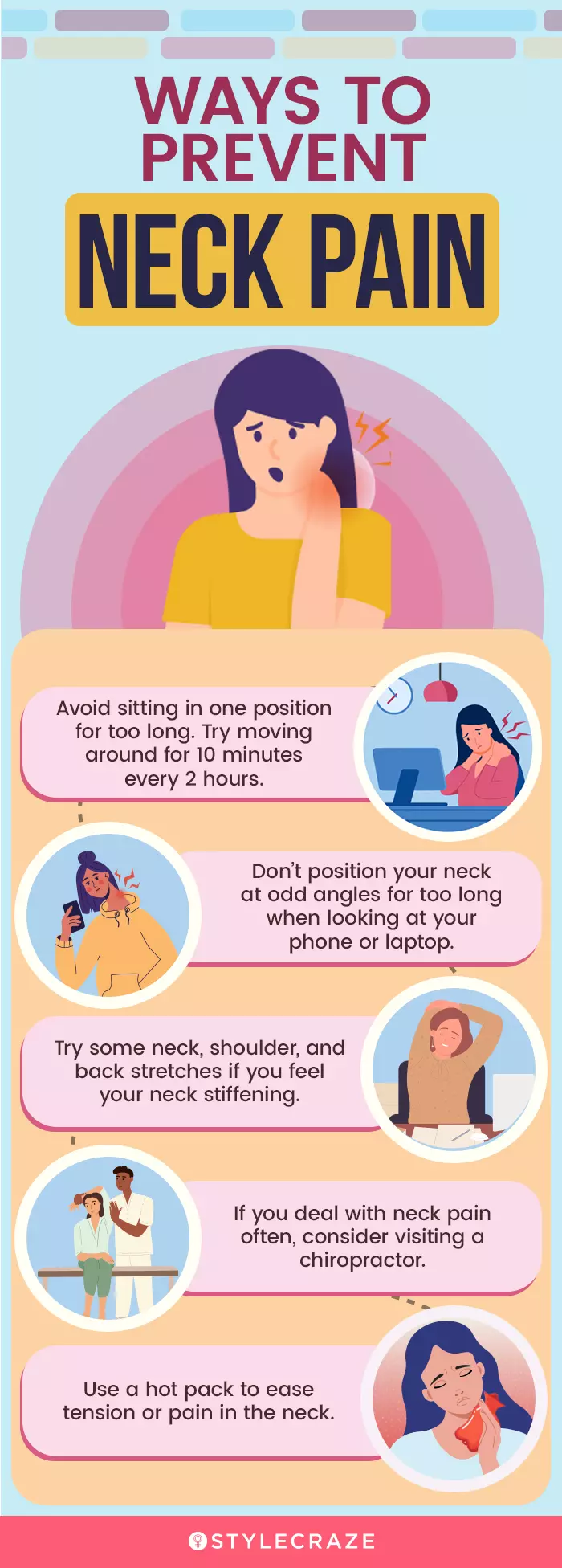
 Quick Tip
Quick TipNeck pain may develop from a neck injury, muscle tension, stress, poor sleeping posture, and prolonged leaning or screentime. While chiropractic care is often the most effective solution for neck ache, certain home remedies may also provide relief. Muscle-strengthening exercises, certain yoga poses, some essential oils, ice packs, massage, and apple cider vinegar are among the most commonly used remedies to relieve soreness in neck muscles. In addition, to prevent neck pain, avoid straining the muscles on your neck by fixing laptops at eye level, avoiding prolonged screentime or driving, and improving your sleep posture. For persistent or chronic neck pain, seek medical guidance.
Frequently Asked Questions
Is heat or ice better for neck pain?
Both are good for neck pain. It is advised to use an ice pack for the first 48 hours to reduce swelling and use heat to loosen your muscles. However, do not keep it for more than 20 minutes.
Do hot showers help neck pain?
Yes, it may help relax stiff muscles.
Why does my neck hurt on one side?
There can be many reasons for neck pain on one side. The most common reasons include poor posture, bad sleeping position, or stress on the muscles. More serious reasons can be pinched nerves, injury, or diseases like meningitis.
What are the red flags for neck pain?
While neck pain is usually not a serious concern, in some cases it can be a sign of serious medical issues. Some red flags or indications include severe pain, loss of bladder control, weakness, or fever.
What helps neck pain at the base of the skull?
Some remedies that can help neck pain at the base of the skull are stretching, massage, heat or cold therapy, or physical therapy.
What does a chiropractor do for neck pain?
Some techniques that a chiropractor may use for neck pain are exercise, soft tissue therapy, and spinal manipulation.
Are there any medical conditions that can cause neck pain?
Some medical conditions that may cause neck pain include cervical disc herniation, meningitis, rheumatoid arthritis, osteoarthritis, whiplash, or tumors.
Key Takeaways
- The most common sources of neck pain are muscle tension and neck injury.
- Natural and effective home remedies such as Epsom salt, ice packs, apple cider vinegar, essential oils, etc., can help alleviate neck pain.
- Yoga, light neck stretches, and exercises are also helpful.
- But, if the above solutions don’t help, it is crucial to diagnose the issue and take appropriate action to stop it from getting worse.
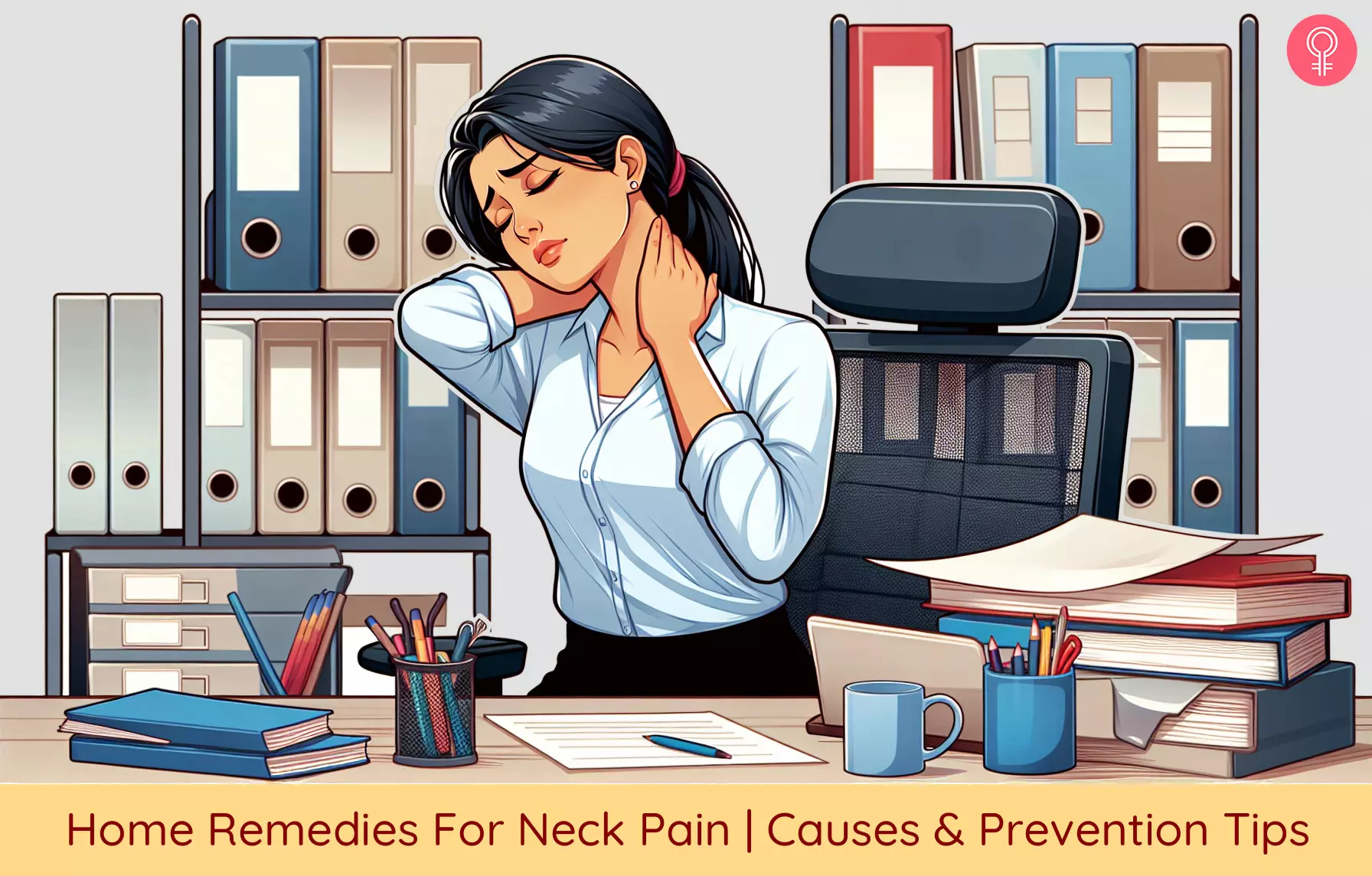
Image: Dall·E/StyleCraze Design Team
References
Articles on StyleCraze are backed by verified information from peer-reviewed and academic research papers, reputed organizations, research institutions, and medical associations to ensure accuracy and relevance. Read our editorial policy to learn more.
- Neck pain, BMJ Clinical Evidence, US National Library of Medicine, National Institutes of Health.
https://www.ncbi.nlm.nih.gov/pmc/articles/PMC2907992/ - Implementation of neck/shoulder exercises for pain relief among industrial workers: A randomized controlled trial, BMC Musculoskeletal Disorders, US National Library of Medicine, National Institutes of Health.
https://www.ncbi.nlm.nih.gov/pmc/articles/PMC3188479/ - Effects of yoga on chronic neck pain: a systematic review of randomized controlled trials, Journal of Physical Therapy Science, US National Library of Medicine, National Institutes of Health.
https://www.ncbi.nlm.nih.gov/pmc/articles/PMC4971133/ - The Effectiveness of Aromatherapy in Reducing Pain: A Systematic Review and Meta-Analysis, Pain Research and Treatment, US National Library of Medicine, National Institutes of Health.
https://www.ncbi.nlm.nih.gov/pmc/articles/PMC5192342/ - Antioxidant, analgesic and anti-inflammatory effects of lavender essential oil, Annals of the Brazilian Academy of Sciences, US National Library of Medicine, National Institutes of Health.
https://www.ncbi.nlm.nih.gov/pubmed/26247152 - Evaluation of the chemical composition, antioxidant and anti-inflammatory activities of distillate and residue fractions of sweet basil essential oil, Journal of Food Science and Technology, US National Library of Medicine, National Institutes of Health.
https://www.ncbi.nlm.nih.gov/pmc/articles/PMC5495712/ - Acupuncture for neck disorders, Cochrane Database of Systematic Reviews, US National Library of Medicine, National Institutes of Health.
https://www.ncbi.nlm.nih.gov/pubmed/27145001 - Vinegar: Medicinal Uses and Antiglycemic Effect, Medscape General Medicine, US National Library of Medicine, National Institutes of Health.
https://www.ncbi.nlm.nih.gov/pmc/articles/PMC1785201/ - Massage reduces pain perception and hyperalgesia in experimental muscle pain: a randomized, controlled trial, The Journal of Pain, US National Library of Medicine, National Institutes of Health.
https://www.ncbi.nlm.nih.gov/pubmed/18455480 - Cold-water immersion and other forms of cryotherapy: physiological changes potentially affecting recovery from high-intensity exercise, Extreme Physiology & Medicine, US National Library of Medicine, National Institutes of Health.
https://www.ncbi.nlm.nih.gov/pmc/articles/PMC3766664/ - Vitamin D supplementation for patients with chronic pain, Scandinavian Journal of Primary Health Care, US National Library of Medicine, National Institutes of Health.
https://www.ncbi.nlm.nih.gov/pmc/articles/PMC3347929/ - Analgesic and analgesia-potentiating action of B vitamins, Schmerz, US National Library of Medicine, National Institutes of Health.
https://www.ncbi.nlm.nih.gov/pubmed/12799982 - Additive Antinociceptive Effects of a Combination of Vitamin C and Vitamin E after Peripheral Nerve Injury, PLoS One, US National Library of Medicine, National Institutes of Health.
https://www.ncbi.nlm.nih.gov/pmc/articles/PMC3237606/ - The role of magnesium in pain, Magnesium in the Central Nervous System, US National Library of Medicine, National Institutes of Health.
https://www.ncbi.nlm.nih.gov/books/NBK507245/ - When should a cervical collar be used to treat neck pain?, Current Reviews in Musculoskeletal Medicine, US National Library of Medicine, National Institutes of Health.
https://www.ncbi.nlm.nih.gov/pmc/articles/PMC2684205/ - Moist heat or dry heat for delayed onset muscle soreness, Journal of Clinical Medicine Research, US National Library of Medicine, National Institutes of Health.
https://pubmed.ncbi.nlm.nih.gov/24171053/# - Cervical spondylosis and neck pain, BMJ, US National Library of Medicine, National Institutes of Health.
https://www.ncbi.nlm.nih.gov/pmc/articles/PMC1819511/ - Relationship between Neuropathic Pain and Obesity, Pain Research and Treatment, US National Library of Medicine, National Institutes of Health.
https://www.ncbi.nlm.nih.gov/pmc/articles/PMC4904620/
Read full bio of Dr. Abby Kramer
Read full bio of Arshiya Syeda
Read full bio of Moksha Gandhi






